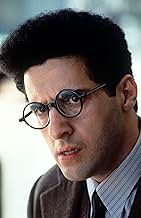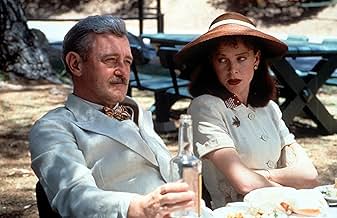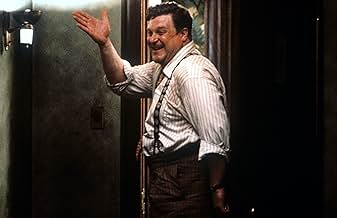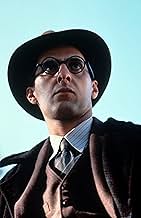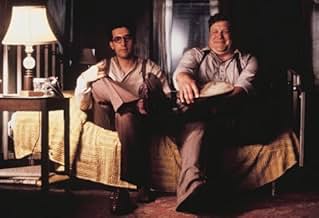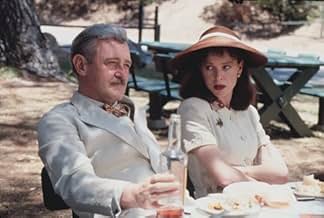Un famoso dramaturgo neoyorquino se ve tentado a trasladarse a California para escribir guiones de películas y allí descubre la realidad infernal de Hollywood.Un famoso dramaturgo neoyorquino se ve tentado a trasladarse a California para escribir guiones de películas y allí descubre la realidad infernal de Hollywood.Un famoso dramaturgo neoyorquino se ve tentado a trasladarse a California para escribir guiones de películas y allí descubre la realidad infernal de Hollywood.
- Nominado a 3 premios Óscar
- 19 premios ganados y 29 nominaciones en total
Meagen Fay
- Poppy Carnahan
- (as Megan Faye)
- Dirección
- Guionistas
- Todo el elenco y el equipo
- Producción, taquilla y más en IMDbPro
Opiniones destacadas
I recently purchased "Barton Fink" along with "Miller's Crossinhg", another Coen Brothers gem.
Barton Fink quite simply is a writer who cannot see the forest for the trees. He is so taken with the fact that he is a writer that he can't write. He is so idealistic that he misses fantastic opportunities to become a writer for the ages because he wastes precious time proselytizing. John Goodman perfectly sums up everyone's frustration with Barton Fink when after a series of unfortunate occurrences, Barton asks him "Why me?" to which John's character answers "Because you don't LISTEN!" Set in 1930s Hollywood we follow the exploits of a one-hit wonder, Barton Fink, who has written a successful Broadway play and is summoned by the powers that be to Hollywood. After much cajoling to take the job from his agent, Barton arrives in Los Angeles determined to become the writer for the common man where he insists true stories live. The trouble with Barton, however, is he does not have time for the common man because he has so romanticized their lot as well as his particular quest in speaking for them.
Excellent performances from John Turturo, John Goodman, Judy Davis, John Polito (often overlooked, but his scenes ALWAYS become his!!) and the inimitable Tony Shaloub.
I have decided after a slew of Coen Brothers films I currently have in my collection, that any project these guys are involved with deserve more than passing scrutiny.
Barton Fink quite simply is a writer who cannot see the forest for the trees. He is so taken with the fact that he is a writer that he can't write. He is so idealistic that he misses fantastic opportunities to become a writer for the ages because he wastes precious time proselytizing. John Goodman perfectly sums up everyone's frustration with Barton Fink when after a series of unfortunate occurrences, Barton asks him "Why me?" to which John's character answers "Because you don't LISTEN!" Set in 1930s Hollywood we follow the exploits of a one-hit wonder, Barton Fink, who has written a successful Broadway play and is summoned by the powers that be to Hollywood. After much cajoling to take the job from his agent, Barton arrives in Los Angeles determined to become the writer for the common man where he insists true stories live. The trouble with Barton, however, is he does not have time for the common man because he has so romanticized their lot as well as his particular quest in speaking for them.
Excellent performances from John Turturo, John Goodman, Judy Davis, John Polito (often overlooked, but his scenes ALWAYS become his!!) and the inimitable Tony Shaloub.
I have decided after a slew of Coen Brothers films I currently have in my collection, that any project these guys are involved with deserve more than passing scrutiny.
Re-watching this after I guess decades?
I enjoyed it but not overwhelmingly so. I think less than when i originally watched.
However I am reading, with amusement, the other reviews on here. They go on and on about how the movie skewers Hollywood and New York elites. No it doesn't. Instead this movie is dead simple: a playwright who says he is for the common man (and I mean man) is not really so. He is more interested in being seen as the great artist.
How do we see this?
He comes out to Hollywood and goes on and on in front of John Goodman about how he is for he common man while ignoring what Goodman had to say. Goodman repeated three times how he had stories to tell and Fink just ignored him.
Fink is more interested in himself as the great writer than actually focusing on the ask: write a wrestling movie, don't overthink it, write something similar to what others have done.
How do we see this? He insists on staying in a fleabag hotel as a sort of hairshirt to goose his artistic suffering and therefore creativity. But he doesn't need that creativity as he has been asked to write a straightforward wrestling movie in the style of past movies.
He could have stayed in a fancy hotel, enjoyed the lifestyle and written the wrestling movie.
Oh and those Hollywood elites? What the same ones who want to put out a wrestling movie that the public loves. Some elites huh!
I enjoyed it but not overwhelmingly so. I think less than when i originally watched.
However I am reading, with amusement, the other reviews on here. They go on and on about how the movie skewers Hollywood and New York elites. No it doesn't. Instead this movie is dead simple: a playwright who says he is for the common man (and I mean man) is not really so. He is more interested in being seen as the great artist.
How do we see this?
He comes out to Hollywood and goes on and on in front of John Goodman about how he is for he common man while ignoring what Goodman had to say. Goodman repeated three times how he had stories to tell and Fink just ignored him.
Fink is more interested in himself as the great writer than actually focusing on the ask: write a wrestling movie, don't overthink it, write something similar to what others have done.
How do we see this? He insists on staying in a fleabag hotel as a sort of hairshirt to goose his artistic suffering and therefore creativity. But he doesn't need that creativity as he has been asked to write a straightforward wrestling movie in the style of past movies.
He could have stayed in a fancy hotel, enjoyed the lifestyle and written the wrestling movie.
Oh and those Hollywood elites? What the same ones who want to put out a wrestling movie that the public loves. Some elites huh!
I liken the Coen brothers to Haagen-Daz ice cream, i.e., various stages of good. I would argue this dark film, laden with more allegories than Dante, is not their best...but, it's good, damn good. To begin with, stellar performances form Turturro, Goodman, Mahoney, Buscemi and Lehner. The thing I find amazing is the skill in bringing so much darkness to such a bright, colorful cinemagraphic work-- remindful of Ingmar Bergman's Cries and Whispers, in that regard-- that teeters on the edge. Goodman's last scene walking into the burning hotel room is eerie but very bright (why not? The damn place is burning down.) This is another great Coen brother film and let's hear it for Ethan and Joel! See it!
I am absolutely amazed at the fantastic taste of the imdb readership, having loved this film for years and always been told by people I'd told about it and persuaded to watch that it was no good, I finally find some other people out there who love it as much as me, posting (mostly) extremely positive comments...This is a fabulous film, dripping with a brooding, sticky atmosphere that draws you in to the clammy world of Barton Fink, sat in his hotel room listening to the creaking of the wallpaper as it dribbles moistly from the walls, searching for inspiration in his tacky painting and dusty typewriter...Perhaps it is a little dark for some tastes, but as black comedy goes this is the blackest and the most biting there is, the Hollywood system and New York theatrical snobbery lampooned with equal viciousness. Deep insight into the nature of the creative spirit, a plethora of fine performances bringing at first stereotypical characters to full life (despite the unreal, fable-like atmosphere created by the slimy, glistening colours reminiscent of the films of Jeunet&Caro...), and many moments of hilarity make this a perfect movie, one I would not hesitate in recommending to anyone despite the fairly high probability they will hate it. A lack of any underlying morality, an absence of absolutes of right and wrong, good and bad, give this film a unique feeling that it could go anywhere. The last twenty minutes are about the most powerful I have ever seen in anything, at the end of almost every scene I thought it could end there and be an amazing film, yet each further scene only added further depth and poignancy. The first time I saw it, it left me drained, mind spinning, hands shaking, barely able to reach for the remote to rewind it to watch it again...
You are either going to love or hate this one, and I doubt you'll know which until it's over. Maybe you won't know even then.
In 1941, Barton Fink (John Turturro) is a successful Broadway playwright. Now that he's got some success under his belt, he says he wants to write plays for "the common man". But his agent has a tempting offer. A movie studio wants him to come to LA and write screenplays for 1000 dollars a week. The agent convinces him to go. Barton checks into the Hotel Earle, which has ornate decorations in the common areas, but is a dump from the standpoint of Barton's room. The heat has the wallpaper peeling off the walls. The sole decoration in Barton's room is the picture of a woman sitting on the beach, her arm raised to block the sun. Remember this picture - it's important.
Barton's first assignment is to write a "wrestling picture" starring Wally Beery. But Barton has writer's block for assorted reasons, one of them being that he knows nothing about this subject. So he stares at his typewriter with the dread an insomniac might stare at his bed. But then what seemed to start out being a film about how the studio system can beat the creativity and the confidence out of a successful writer changes course and becomes something that is completely surreal and even nightmarish by the end. I can really say nothing more specific than that without giving things away.
The Coens wrote Barton Fink when they were having writer's block trying to write Miller's Crossing because of the complexity of the plot. So did they manage to pack lots of symbolism into a tight, coherent package, or did they simply let their imagination run wild and undisciplined in an attempt to get back on track on the other film? I have no idea. I just know that I like it and - for me - it's great for repeat viewings.
One more thing - How can it be so hot in LA, and then suddenly WWII has started, which would make it December? Why is it Barton doesn't seem to notice WWII has started without being told and then really has no reaction. He really isn't plugged into "the common man" is he?
In 1941, Barton Fink (John Turturro) is a successful Broadway playwright. Now that he's got some success under his belt, he says he wants to write plays for "the common man". But his agent has a tempting offer. A movie studio wants him to come to LA and write screenplays for 1000 dollars a week. The agent convinces him to go. Barton checks into the Hotel Earle, which has ornate decorations in the common areas, but is a dump from the standpoint of Barton's room. The heat has the wallpaper peeling off the walls. The sole decoration in Barton's room is the picture of a woman sitting on the beach, her arm raised to block the sun. Remember this picture - it's important.
Barton's first assignment is to write a "wrestling picture" starring Wally Beery. But Barton has writer's block for assorted reasons, one of them being that he knows nothing about this subject. So he stares at his typewriter with the dread an insomniac might stare at his bed. But then what seemed to start out being a film about how the studio system can beat the creativity and the confidence out of a successful writer changes course and becomes something that is completely surreal and even nightmarish by the end. I can really say nothing more specific than that without giving things away.
The Coens wrote Barton Fink when they were having writer's block trying to write Miller's Crossing because of the complexity of the plot. So did they manage to pack lots of symbolism into a tight, coherent package, or did they simply let their imagination run wild and undisciplined in an attempt to get back on track on the other film? I have no idea. I just know that I like it and - for me - it's great for repeat viewings.
One more thing - How can it be so hot in LA, and then suddenly WWII has started, which would make it December? Why is it Barton doesn't seem to notice WWII has started without being told and then really has no reaction. He really isn't plugged into "the common man" is he?
¿Sabías que…?
- TriviaThe first film to win all three major awards (Palme D'or, Best Director, and Best Actor) at the Cannes Film Festival. Also, it was unanimously chosen for the Palme D'or.
- ErroresBriefly visible at the top of the screen when Detective Mastrionotti introduces himself to Barton.
- Citas
Charlie Meadows: Look upon me! I'll show you the life of the mind!
- Créditos curiososThe 20th Century Fox logo appears over silence; the "fanfare" is not played.
- ConexionesEdited into The Clock (2010)
- Bandas sonorasFor Sentimental Reasons
by Edward Heyman, Al Sherman and Abner Silver
Licenced with Permission the Successors of Marlo Music Corporation (ASCAP)
Selecciones populares
Inicia sesión para calificar y agrega a la lista de videos para obtener recomendaciones personalizadas
- How long is Barton Fink?Con tecnología de Alexa
Detalles
- Fecha de lanzamiento
- Países de origen
- Idioma
- También se conoce como
- Бартон Фінк
- Locaciones de filmación
- Productoras
- Ver más créditos de la compañía en IMDbPro
Taquilla
- Presupuesto
- USD 9,000,000 (estimado)
- Total en EE. UU. y Canadá
- USD 6,153,939
- Fin de semana de estreno en EE. UU. y Canadá
- USD 268,561
- 25 ago 1991
- Total a nivel mundial
- USD 6,154,231
- Tiempo de ejecución1 hora 56 minutos
- Color
- Mezcla de sonido
- Relación de aspecto
- 1.85 : 1
Contribuir a esta página
Sugiere una edición o agrega el contenido que falta





